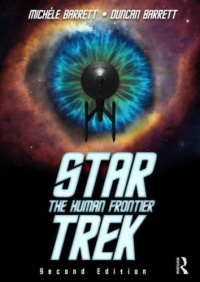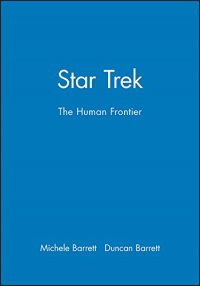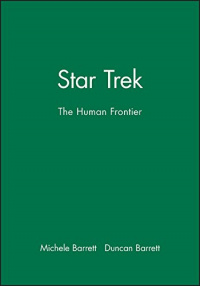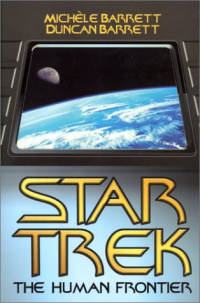Star Trek: The Human Frontier
Das Referenzwerk Star Trek: The Human Frontier ist ein Buch, dass eine Analyse der Ideen und Ideale hinter Star Trek bietet.
Inhaltsverzeichnis
Inhalt[Bearbeiten]
Ausgaben bei Blackwell und Polity Press 2000[Bearbeiten]
- Vom Umschlagtext:
In a world that has been shrunk by modern communications and transport, Star Trek has maintained the values of western maritime exploration, and the discovery of "Strange New Worlds" in space. This a Starry Seaa has become a familiar metaphor in the thirty--year history of Star Trek, providing a backdrop to the relentless questioning of human nature. The progressive politics that underpinned the original programme is still very much a part of Star Treka s overall philosophy. The earlier series of Star Trek shows a faith in science and rationalism, and in a benign, liberal leadership. This a moderna order is now in decline, as we can see in the introduction of religion, mental illness and fragmented identities in Deep Space Nine and Voyager. This book addresses these issues in philosophical, literary, historical and cultural contexts, bringing together an unusual combination of authorial expertise. Written to appeal to those who dona t know Star Trek from Star Wars, as well as those with the ferociously detailed knowledge of the true Trekker, it explains the ideas and ideals behind this significant cultural phenomenon.
Ausgabe bei Routledge Chapman Hall[Bearbeiten]
- Vom Umschlagtext:
Michèle and Duncan Barrett are mother and son - she a distinguished social theorist now working in literary and cultural studies, he a writer still in his teens. Together they take Star Trek - the TV series, films, and related projects - and explore it for what it tells us (and asks) about being human. From the progressive politics that underpinned the original program to the declining faith in rationalism that haunts Deep Space Nine and Voyager, the Star Trek story has grappled with powerful philosophical and social issues. And throughout its thirty-year history, Star Trek has explored its themes through the metaphors of Western maritime exploration. Yet unlike the voyagers of earlier centuries, its crews have sailed not by sea but by galaxy. But in search of what?
As Michèle and Duncan Barrett persuasively demonstrate here, the continuing voyage of Star Trek is a quest not for new lands but for new answers: what does it mean to be human? Witten for both the true Trekker and the complete novice, Star Trek: The Human Frontier is that rare work of cultural studies, informed by the knowledge of literature, social thought, and popular culture.
2. Auflage[Bearbeiten]
- Vom Umschlagtext:
In a world shrunk by modern transport and communication, Star Trek has maintained the values of western maritime exploration through the discovery of 'strange new worlds' in space. Throughout its fifty-year history, the 'starry sea' has provided a familiar backdrop to an ongoing interrogation of what it means to be human.
This book charts the developing Star Trek story from the 1960s through to the present day. Although the core values and progressive politics of the series' earliest episodes have remained at the heart of Star Trek throughout half a century, in other ways the story it tells has shifted with the times. While The Original Series and The Next Generation showed a faith in science and rationalism, and in a benign liberal leadership, with Deep Space Nine and Voyager that 'modern' order began to decline, as religion, mental illness and fragmented identities took hold.
Now fully revised and updated to include the prequel series Enterprise and the current reboot film series, this new second edition of Star Trek: The Human Frontier – published to coincide with Star Trek's golden jubilee celebrations – addresses these issues in a range of cultural contexts, and draws together an unusual combination of expertise. Written to appeal to both the true Trekker and those who don't know Star Trek from Star Wars, the book explores and explains the ideas and ideals behind a remarkable cultural phenomenon.
Kapitel[Bearbeiten]
- List Of Illustrations
- Preface And Acknowledgments
- Introduction
- Part One: Exploration
- Part Two: Humanity On Trial
- Part Three: Boldly Going Postmodern
- Conclusion
- Notes
- Index



